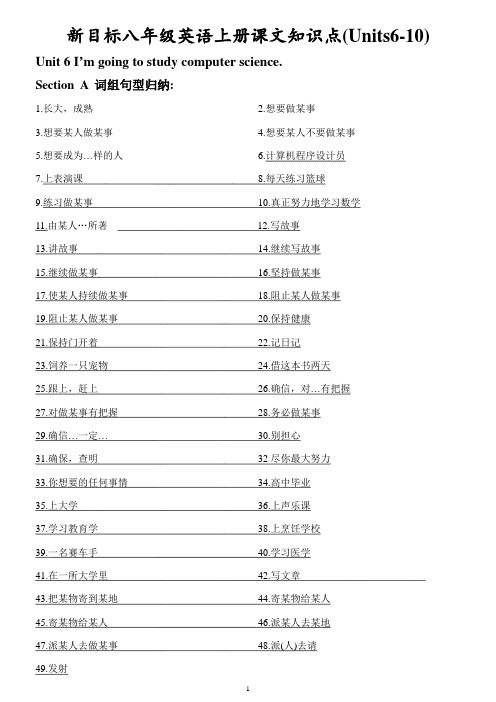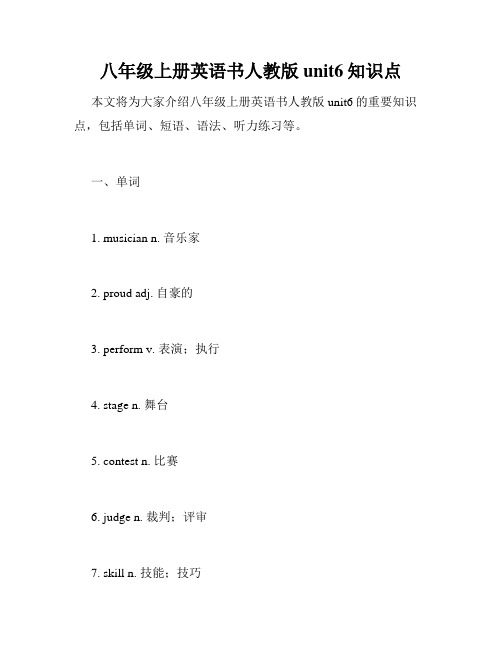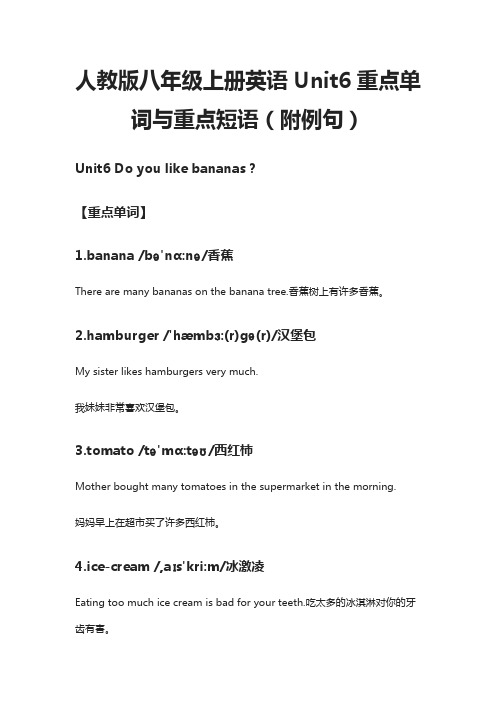八年级上英语6-10知识点
八年级上册英语unit6知识点整理

八年级上册英语unit6知识点整理(经典版)编制人:__________________审核人:__________________审批人:__________________编制单位:__________________编制时间:____年____月____日序言下载提示:该文档是本店铺精心编制而成的,希望大家下载后,能够帮助大家解决实际问题。
文档下载后可定制修改,请根据实际需要进行调整和使用,谢谢!并且,本店铺为大家提供各种类型的经典范文,如演讲稿、总结报告、合同协议、方案大全、工作计划、学习计划、条据书信、致辞讲话、教学资料、作文大全、其他范文等等,想了解不同范文格式和写法,敬请关注!Download tips: This document is carefully compiled by this editor. I hope that after you download it, it can help you solve practical problems. The document can be customized and modified after downloading, please adjust and use it according to actual needs, thank you!In addition, this shop provides you with various types of classic sample essays, such as speech drafts, summary reports, contract agreements, project plans, work plans, study plans, letter letters, speeches, teaching materials, essays, other sample essays, etc. Want to know the format and writing of different sample essays, so stay tuned!八年级上册英语unit6知识点整理好问的人,只做了五分种的愚人;耻于发问的人,终身为愚人。
人教版新目标英语八年级上册词组句型归纳Units6-10(汉译英 无答案)

新目标八年级英语上册课文知识点(Units6-10) Unit 6 I’m going to study computer science.Section A 词组句型归纳:1.长大,成熟2.想要做某事3.想要某人做某事4.想要某人不要做某事5.想要成为…样的人6.计算机程序设计员7.上表演课8.每天练习篮球9.练习做某事10.真正努力地学习数学11.由某人…所著12.写故事13.讲故事14.继续写故事15.继续做某事16.坚持做某事17.使某人持续做某事18.阻止某人做某事19.阻止某人做某事20.保持健康21.保持门开着22.记日记23.饲养一只宠物24.借这本书两天25.跟上,赶上26.确信,对…有把握27.对做某事有把握28.务必做某事29.确信…一定…30.别担心31.确保,查明32尽你最大努力33.你想要的任何事情34.高中毕业35.上大学36.上声乐课37.学习教育学38.上烹饪学校39.一名赛车手40.学习医学41.在一所大学里42.写文章43.把某物寄到某地44.寄某物给某人45.寄某物给某人46.派某人去某地47.派某人去做某事48.派(人)去请49.发射Unit 6 I’m going to study computer science.Section B and Self Check词组句型归纳:1.新年决定2.下定决心干某事3.组建一支足球队,成为队的一员4.取得好成绩5. 吃更健康的食品6.多锻炼7. 上吉他课8. 听起来有趣9. 学另一门外语10. 不适合我11.实现他们的决定12.能做某事13.遵行他们14.关于做某事15.让你自己成为一个更优秀的人16.必须安排更多的时间去学习17.新年伊始18.下决定的时候19.一种承诺20.大多数时间21.许下承诺22.向某人许下承诺23.向某人许下承诺做某事24.信守承诺25.违背承诺26.许诺做某事27.许诺不做某事28.许诺某人做某事29.许诺某人不做某事30.许诺某人某事31.许诺某人某事32整理我的房间33.你向你自己许的承诺34.最普通的一种35.在…之初,在…开始的时候36.在…结束时37.首先38.最后39.从头到尾40.从一开始41.改善我们的生活42.对…做出改进43.写下44.他们来年的决定和计划45.身体健康46.开始一个锻炼计划47.少吃快餐48.关于…与…有关49.于…没关50.与自我提高有关51. 学着做…开始做…52.学着做某事,开始做某事53.培养一个爱好54.为学校作业制定周计划55.一个周计划56.有一个共同点57.太难了无法遵行58.因为这个理由59.最好的决心是没有决心60.质疑某人61.质疑做决定的观点62.回答一个问题63.问题的答案64….的意思65.我自己的个人提升66.让我的家人开心67.一起听音乐唱歌68.改善我的身体健康状况的想法69.我与家人和朋友的关系70.在学校表现更好71.让它变得更清洁,更环保72.把地铁建得更73.开车上班74.高中毕业75.上大学75.忘记..将...抛之脑后76.忘记,忘掉,将事情抛之脑后Unit 7 Will people have robots?Section A词组句型归纳:1.做出预言,预测2.预测将来3.在人们的家里4.在家5.在电脑上,通过电脑6.免费的7.不会在纸上8.一张纸9.两张纸10.一张报纸11.一篇论文12.一张试卷13.活到200岁14.在100年以后15.多久以后16. 在将来17.今后18.今后19.同意某人的意见20.不同意某人的意见21.同意你的计划22. 同意做某事23.同意…24.空气污染25.噪音污染26.更多的污染27.污染环境28.更拥挤更受污染的29.更少的人30.更少的空闲时间31.更少地使用地铁32我不这么认为33….将会怎么样?34.处于(极大)危险中35.脱离危险36.危险的37.做某事是安全的38.搬到其他行星上39.在地球上40.究竟,到底41.种植更多的树42.参与,发挥作用43.在做某事中起作用44.参加,参与45.参加,参与46.拯救地球47.世界和平48.和平的49.更少的淡水50.在海洋里51.建造更多的楼房52.在农村53.更少的事情要做54.在天空中Unit 7 Will people have robots?Section B and Self Check词组句型归纳:1.太空站,宇宙空间站2.在太空站3.在太空4.为…腾出空间5.住在一栋公寓里6.乘火箭去月球7.乘火箭去月球8.许多苍蝇9.乔的10年后的生活10.了解11.像人类一样思考12.像13.人类的仆人14.帮着做家务15.在脏的或危险的地方工作16.有某人/某物正在做某事17.在工厂里工作18.制造小汽车19.做简单的工作20.多次,反复地21.感到厌烦,觉得无聊22.看起来像人类23.能像我们一样做事情24.有看头,观赏起来有趣25.相信某人的话26.信任某人,信仰某事27.像人一样移动28.醒来29.入睡30.在25年到50年之后31.花费数百年的时间32许多不同的形状33.一些…另一些…34.在形状上,健康的35.不成形的,身体状况不佳的36.倒塌37.掉入…,落入…38.落后39.爱上…40.从…上掉下来41.被…绊倒42.寻找43.似乎不可能44.尽可能地…45.在不久的将来46.在某一点上,在某种程度上47.像我们一样能做同样的事情48.哪一方49.结识许多有趣的人50.不利于(饲养)宠物51.饲养一只鸟52.在这周之内53.穿讲究的衣服54.看上去随意的多55.去度假56.如果可能的话57.如果可能的话58.从现在起20年后你的生活59.单词的意思60.飞往天空61.一生中62.我不害怕63.很像人类的64.制造蛇形机器人Unit 8 How do you make a banana milk shake?Section A 词组句型归纳:1.奶昔2.香蕉奶昔3.制作香蕉奶昔4.喝奶昔5.握手6.摇头7.一瞬间8.打开,接通9.关闭,切断10.调高,调大,出现11.调低,调小,拒绝12.打开食物搅拌器13.切碎,把…切成片14.切碎,把…切成片15.把…倒进…里16.把牛奶倒进食物搅拌器里17.把…放到…里18.把…放到…上19.将香蕉剥皮20.许多香蕉皮21.让某人…22.让某人做某事23.为某人做某物24.为某人做某物25.某人需要某物26.某人需要做某事27.某物需要做某事28.某物需要做某事29.你不需要告诉我。
八年级上册英语书人教版unit6知识点

八年级上册英语书人教版unit6知识点本文将为大家介绍八年级上册英语书人教版unit6的重要知识点,包括单词、短语、语法、听力练习等。
一、单词1. musician n. 音乐家2. proud adj. 自豪的3. perform v. 表演;执行4. stage n. 舞台5. contest n. 比赛6. judge n. 裁判;评审7. skill n. 技能;技巧8. applause n. 掌声9. instrument n. 乐器10. audience n. 观众二、短语1. take part in 参加2. be similar to 与……相似3. get through 通过4. be proud of 为……感到自豪5. look forward to 期待6. in the end 最终7. give up 放弃8. in public 公开地9. be afraid of 害怕10. make mistakes 犯错误三、语法1. 报表态和祈使句英语中有两种语气,分别是陈述语气和祈使语气。
陈述语气是用来陈述事实或表达想法的,例如“I have a pen”(我有一支笔)。
祈使语气则主要用于表达命令、请求或建议,例如“Give me the pen”(把笔给我)。
2. 现在进行时现在进行时用于表示当前正在进行的动作或状态,通常由“be+动词的现在分词”构成。
例如:I am eating dinner(我正在吃饭),He is running in the park(他正在公园跑步)。
四、听力练习1. 听力理解听力练习是提高英语技能的重要途径,通过听力练习可以提高听力理解和口语表达能力。
可以通过听英语广播、电视节目、歌曲、影片等来进行听力练习。
2. 注意力集中在进行听力练习的过程中,需要注意力集中,不要被其他事物干扰。
可以通过找一片安静的环境同时获得材料进行锻炼。
本文介绍了八年级上册英语书人教版unit6的重要知识点,包括单词、短语、语法和听力练习等。
人教版八年级英语上册6-10 单元单词和短语

三、重要句子(语法) What do you want to be when you grow up? I want to be an engineer. How are you going to do that? I’m going to study math really hard. Where are you going to work? I’m going to move to Shanghai. When are you going to start? I’m going to start when I finish high school and college.
Unit 6 I’m going to study computer science
grow up 长大, •promise to do sth许诺去做某事, •be sure about对某事确信, •make sure 确信/有把握, •send…to…把…发送到…/把…寄…,
•send sb.sth.=send sth.to sb. •be able to do sth.能/能够 • the meaning of …的意思/含义, • different kinds of 不同种类的, •have sth in common有共同之处, •write down写下/记下, 1. kind of =a little =a bit= a little bit 有点儿
二.语法: 1.What will the future be like? 2.Cities will be more crowed and polluted. And there will be fewer trees. 3.Will people use money in 100 years?
(全)人教版八年级上册英语Unit6重点单词与重点短语(附例句)

人教版八年级上册英语Unit6重点单词与重点短语(附例句)Unit6 Do you like bananas?【重点单词】1.banana /bə'nɑ:nə/香蕉There are many bananas on the banana tree.香蕉树上有许多香蕉。
2.hamburger /'hæmbɜ:(r)ɡə(r)/汉堡包My sister likes hamburgers very much.我妹妹非常喜欢汉堡包。
3.tomato /tə'mɑ:təʊ/西红柿Mother bought many tomatoes in the supermarket in the morning.妈妈早上在超市买了许多西红柿。
4.ice-cream /,aɪs'kri:m/冰激凌Eating too much ice cream is bad for your teeth.吃太多的冰淇淋对你的牙齿有害。
5.salad /'sæləd/沙拉The fruit salad is delicious.水果沙拉很美味。
6.strawberry /'strɔ:berɪ/草莓I like sweet and sour strawberries.我喜欢酸甜的草莓。
7.pear /peə(r)/梨Pear is a kind of fruit to quench thirst.梨是一种解渴的水果。
k /mɪlk/牛奶Grandfather is milking milk on the farm.爷爷在农场里挤牛奶。
9.bread /bred/面包Grandma likes to eat soft and sweet bread.奶奶喜欢吃又软又甜的面包。
10.birthday /'bɜ:(r)θdeɪ/生日I sang a happy birthday song at Tom's birthday party.我在汤姆的生日聚会上唱了一首生日快乐歌。
八年级英语上册“Unit 6”必背知识点

八年级英语上册Unit 6 I'm going to study computer science.必背知识点一、重点短语1. grow up:成长;长大2. every day:每天3. be sure about:对……有把握4. make sure:确信;务必5. send…to…:把……送到……6. be able to:能;能够7. the meaning of:……的意思/含义8. write down:写下;记下9. different kinds of:不同种类的10. hardly ever:几乎不;很少11. have to do with:与……有关系12. take up:开始从事;着手处理;接受13. too…to…:太……而不能……14. be going to + 动词原形:打算做某事15. practice doing:练习做某事16. keep on doing sth.:不断地做某事17. learn to do sth.:学会做某事18. finish doing sth.:做完某事19. promise to do sth.:许诺去做某事20. help sb. to do sth.:帮助某人做某事21. remember to do sth.:记住做某事22. agree to do sth.:同意做某事23. love to do sth.:喜爱做某事24. want to do sth.:想要做某事二、重点句型1. What do you want to be/ become when you grow up? 当你长大的时候想当什么?2. I want to be a/an…(如:computer programmer, doctor, engineer等):我想当……3. My parents want me to be a doctor, but I’m not sure about that. 我的双亲想要我当医生,但我还不确定。
人教版新课标八年级上册英语Unit6知识点归纳

人教版新课标八年级上册英语Unit6知识点归纳人教版新课标八年级上册英语Unit 6知识点归纳Unit 6 I’ re utging than y sister.【复习目标】●谈论个性特征●学会使用形容词的比较级比较人的个性特征●学会比较身边的事物并选择最佳方案【语言目标】● Is that Sa? N, that’s T,He has shrter hair than Sa. He’s aler than Sa.【语言结构】●比较级-er, -ier, re的使用● bth的用法【重点词汇】● re, than,/ re athleti, re ppular,/ twin, bth, be gd at● taller, shrter, thinner, lnger, heavier ,aler, wilder, quieter, funnier,sarter【应掌握的词组】1. lng hair 长头发2. Hw are yu? 你身体好吗?3. Hw ld 多大年纪4. hw tall 多高5. hw lng ag多久前(的事)6.re utging 比较外向7. want/plan t d sth. 意欲,企图8. here are phts f e 这是我的照片9. as yu an see 正如你所看到的10. in se ways在某些地方11. we lk the sae我们看起一样, They lk different 他们看起不同12. the sae t ……多……是一样的13. quite the sae 完全一样14. all the sae 还是,同样应……15. lk like 看起像….一样,而lk the sae看起很像16. g t lts f parties经常参加聚会=ften g t the party17. a little taller 高一点18. take sth. fr sth. 从某处拿/取出某物19. put sth. in sth. 将某物放入某物中20. ake a list f 列出清单21. has l lthes 有漂亮的衣服22. is ppular in shl 在学校受欢迎23. is gd at sprts 擅长体育24. ake e laugh 使我发笑25. that’s nt very iprtant fr e 那对我说并不重要( be iprtant fr sb.)26. put up举起,抬起,挂起,张贴,建造;put n穿上,戴上,上演(戏剧);put dwn=write dwn=py dwn 写下; put ut 伸出,扑灭;put away 收起,收好;put ff推迟;put ne’s heart int…全神贯注于……,全身心投入……27. ppsite views 相反的观点28. a weekendteaher 周末教师29. Abaus Study enter 珠算研究中心30. eleentary shl students 小学生31. be gd with hildren 善于与孩子相处32. have gd grades 成绩出色33. eny telling kes 喜欢讲笑话34. an’t stp talking 不能停止讲话35. help thers 帮助别人,help eah ther互相帮助36. in ne’s free tie在业余时间37. ne f +复数名词(代词)……其中之一38. use sth. t d sth.=d sth.. with sth. 使用…做…39. be/feel srry fr sb. 为某事感到同情或难受;be / feel srry fr sth. 因某事感到抱歉或后悔;be srry +t see/hear 听到或看到某种情况很不安或难过;say srry t sb.向某人道歉40. begin with 从……开始41. next t 在……旁边,紧靠……42. be faus fr 因…而著名,因……而广为人知; be faus as 作为……而知名43. all tgether 总计,总共44. ake sb. d sth. 让/使某人做某事,相似的用法有几个感官动词see, let, hear, wath, feel等【应该掌握的句子】1.hat are yu ding fr vaatin? I’ babysitting y sister.假期你要做什么?我要照顾我的妹妹。
人教版英语八年级课文重点句子u6-10

Unit61.The old man and the sea by Hemingway. 海明威的《老人与海》。
2.I’m going to keep on writing stories.我会继续坚持写故事。
3.My parents want me to be a doctor, 我的父母希望我成为一名医生,但我不确定but I’m not sure about that.4.Not everyone knows what they want to be. 并不是每个人都知道自己想要成为什么。
5.Just make sure you try your best. 只要确保你竭尽全力了。
6.Then you can be anything you want! 那么你就能当上你想做的人了。
7.What do you want to be when you grow up? 你长大以后想要做什么?8.I want to be an engineer. 我想要成为一名工程师。
9.How are you going to do that? 你打算怎样去做呢?10.I’m going to study math really hard.我打算很努力地学习数学。
11.I’m going to move to Shanghai.我打算搬到上海去。
12.I’m going to start when I finish high sc hooland college. 我打算当我完成高中和大学的时候开始。
13.He’s going to take acting lessons.他打算去上表演课。
14.Write articles and send them to magazinesand newspapers. 写文章寄给杂志和报纸。
15.Next year, I’m going to learn to play the piano. 明年我打算学习弹钢琴。
- 1、下载文档前请自行甄别文档内容的完整性,平台不提供额外的编辑、内容补充、找答案等附加服务。
- 2、"仅部分预览"的文档,不可在线预览部分如存在完整性等问题,可反馈申请退款(可完整预览的文档不适用该条件!)。
- 3、如文档侵犯您的权益,请联系客服反馈,我们会尽快为您处理(人工客服工作时间:9:00-18:30)。
Unit6 Im going to study computer science.本单元的话题:谈论自己将来的计划或打算。
本单元的语法:学习一般将来时be going to do sth。
本单元的短语和知识点: 1.词性转换:science (名词,科学)—scientist(名词,科学家) violin(名词,小提琴)--violinst(名词,小提琴家)piano(名词,钢琴)-- pianist(名词,钢琴家)2.grow up成长,长大 3.be good at+名词\代词\动词+ing:擅长… He is good at math,but he isn't good at speaking English.他擅长数学,但是不擅长说英语。
4.keep on doing sth: 继续做某事 5.be sure about:确信,对…有把握His mother isn't sure about his study.他的妈妈对他的学习没有把握。
6. move to +地点:搬(家)到某地 7. take singing\acting lessons 上歌唱课\上表演课=have singing\acting lessons 8. send sb sth = send sth to sb寄\送给某人某物His grandfather often sends him money。
= His grandfather often sends money to him.9. learn to do sth学会做某事10. play the piano弹钢琴 make the soccer team组建足球队 get good grades取得好的成绩 eat healthier food吃更健康的食品 get lots of exercise进行大量锻炼11. foreign language外国语言 12. study hard努力学习most of the time大多数时间14. get back from+地点:从…回来 He will get back from Beijing in 3 days. at the beginning of 在…开始的时候, write down写下/记下,17. different kinds of不同种类的 have to do with关于,与…有关系,take up开始从事20. too+形容词+to do sth:太…以至于不能…so+形容词+that+句子:如此…以至于…形容词+enough to do sth:足够…能够做某事(注意三个句型有时可以互相转换) He is so young that he can′t go to school.他如此年轻以至于不能去上学。
= He is too young to go to school.他太年轻了以至于不能去上学。
= He isn′t old enough to go to school. 22.make sb+形容词:让某人怎么样 The good news made us happy.(注意:news为不可数名词) 23.how to do better at school为“疑问词+不定式”即“疑问词+to do sth”He didn't know when to start.他不知道什么时候开始。
24.go to university 去上大学Unit 7 Will people have robots?本单元的话题:谈论对未来的语言,学习一般将来时will do sth。
本单元的语法:学习一般将来时will do sth。
一般将来时由“助动词will / shall + 动词原型”构成,表示将来某个时间要发生的动作或存在的状态,常与表示将来的时间状语如tomorrow、next week,in 2 days(2天之后)等连用。
(Shall用于第一人称,will可以用于各种人称。
) (will not= won't) 一般疑问句:把肯定句中的will 提到句首即可。
以上两句的一般疑问句为:Will you visit the old man next week? Yes,we will.\No, we won't . 否定句:把肯定句中的will 变为won't 即可。
以上两句的否定句为:We won't visit the old man next week. She won't finish the work in 2 weeks.本单元的短语和知识点: 1.There be结构:There be(is/are/was/were)+某物/某人+某地/某时“There be结构”的一般现在时:There is/are+某物/某人+某地/某时There are 600 students in our school.在我们学校有600个学生。
一般过去时:There was/were+某物/某人+某地/某时There was a school ten years ago. 一般将来时:There will be+某物/某人+某地/某时.= There is going to be+某物/某人+某地/某时. There will be a sport meeting next week.=There is going to be a sport meeting next weeek.下周将有场运动会。
2.on computers在电脑上, on paper在纸上 3.a few +可数名词复数:有一些、有几个 a little +不可数名词:有一些few +可数名词复数:几乎没有(表示否定) little+不可数名词:几乎没有(表示否定) many+可数名词复数:很多,许多 few 的比较级是fewer ,little的比较级是less much+不可数名词:很多,许多 many\much的比较级都是more There will be less polution in the future.在未来将会有更少的污染。
(polution 为不可数名词) We should plant more trees.我们应该种更多的树。
(tree为可数名词) There will be fewer cars in the future.在未来将会有更少的汽车。
(car为可数名词) 4.in(great)danger在(极度)危险中on the earth在地球上save the earth拯救地球 6.in+一段时间:在…之后(多用于一般将来时) He will come back in 2 days.两天之后他将回来。
→How soon will he come back?多久他将回来? 句型 There is\are sb doing sth.有某人正在做某事。
There is a cat eating fish. 10. hundreds of+名词:成百上千的…,许多…(表示模糊数字) 数字+ hundred +名词:几百…(表示具体数字) He has hundreds of book.他有很多书。
He bought two hundred books.他买了二百本书。
12.at some point: 在某些方面free time空闲时间 in one's free time在某人空闲时间Unit 8 How do you make a banana milk shake?本单元的话题:描述做事情的顺序和过程。
(First首先,Next 下面,Then然后,Finally最后)本单元的语法:复习一般现在时。
本单元的短语和知识点:1(P57,1a) turn on打开 turn up调大turn off关上 turn down调小 2. How many+可数名词复数:多少…How much+不可数名词:多少…He has eight books.他有八本书。
→How many books does he have?他有多少本书? 3. 量词的用法:不可数名词常用“数字+量词+不可数名词”来表示。
如: a piece of bread一片面包比较:two pieces of bread两片面包(bread为不可数名词) a glass of orange 一玻璃杯橘子汁 one spoon of butter 一勺黄油 5.one more thing = another one thing 基数词 + more + 名词 = another + 基数词+ 名词:又多少某物He ate an apple,he wanted to eat two more apples. 7.It's time (for sb) to do sth是某人该做某事的时间了。
It's time for us to havelunch. It's time for sth是该做某事的时间了。
It's time for the class.是该上课的时候了。
Unit 9 Can you come to my party?本单元的话题:学会发出、接受或拒绝邀请。
本单元的语法:复习情态动词。
本单元的短语和知识点: 1.on Saturday afternoon 在星期六下午,在具体哪一天的是上午、下午或晚上用on, 2. have to 必须(后跟动词原形)He has to get up early.他必须早起。
→(一般疑问句)Does he get up early? Yes,he does.\No,he doesn't. (否定句)He doesn't have to get up early.他没有必要早起。
4. sth=want sth 想要某物 Jim would like a new pen . Would like to do sth=want to do sth想做某事He'd like to watch TV. Would you like to do sth ? 你愿意做...?(用来提出建议或征求对方意见) ------would you like to go shopping with me ? 你想和我一起去买东西吗? ------Yes,I'd love to ,but I'm doing my homework.我想去,但是我现在正在做家庭作业。
